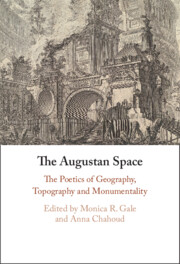Book contents
- The Augustan Space
- The Augustan Space
- Copyright page
- Contents
- Notes on Contributors
- Preface
- Abbreviations
- Introduction
- Chapter 1 The City in Horace’s sermo
- Chapter 2 excucurristi a Neapoli
- Chapter 3 Poetic and Imperial Spaces in Propertius, Books 1–3
- Chapter 4 Horace on Sacred Space
- Chapter 5 Roman Topography, Politics and Gender
- Chapter 6 aurea nunc, olim siluestribus horrida dumis
- Chapter 7 Hippolytus and Egeria in the Woods of Aricia (Virgil, Aen. 7.761–82 and Ovid, Met. 15.479–551)
- Chapter 8 locum tua tempora poscunt
- Chapter 9 imperii Roma deumque locus
- Chapter 10 The Rise and Fall of Virgil’s Sublime Carthage
- Chapter 11 Eccentric Poetry
- Chapter 12 Virgilian Heterotopias
- Chapter 13 loci desperati
- Works Cited
- Index Locorum
- General Index
Chapter 4 - Horace on Sacred Space
The Odes and Augustan Temples
Published online by Cambridge University Press: 14 June 2024
- The Augustan Space
- The Augustan Space
- Copyright page
- Contents
- Notes on Contributors
- Preface
- Abbreviations
- Introduction
- Chapter 1 The City in Horace’s sermo
- Chapter 2 excucurristi a Neapoli
- Chapter 3 Poetic and Imperial Spaces in Propertius, Books 1–3
- Chapter 4 Horace on Sacred Space
- Chapter 5 Roman Topography, Politics and Gender
- Chapter 6 aurea nunc, olim siluestribus horrida dumis
- Chapter 7 Hippolytus and Egeria in the Woods of Aricia (Virgil, Aen. 7.761–82 and Ovid, Met. 15.479–551)
- Chapter 8 locum tua tempora poscunt
- Chapter 9 imperii Roma deumque locus
- Chapter 10 The Rise and Fall of Virgil’s Sublime Carthage
- Chapter 11 Eccentric Poetry
- Chapter 12 Virgilian Heterotopias
- Chapter 13 loci desperati
- Works Cited
- Index Locorum
- General Index
Summary
This chapter looks at potential allusions in Horace’s Odes to the religious buildings in Rome known to have been constructed or substantially repaired by Augustus. These major construction projects in Rome in the Augustan period are naturally a topic of interest to contemporary poets; in the case of the Odes, it can be argued that there are many points of contact between poetic and architectural artefacts, and even that the Roman literary achievement of the Augustan poet as proclaimed in Odes 3.30 can be paralleled with a Roman architectural project of Augustus himself. It is also interesting to note that though Horace’s Odes contain a number of potential allusions to a range of projects in the considerable programme of temple construction and renovation later carefully recorded by Augustus in the Res gestae, there are no allusions to the Temple of Diuus Iulius, perhaps because the memory of Julius Caesar was felt to be too problematic.
Information
- Type
- Chapter
- Information
- The Augustan SpaceThe Poetics of Geography, Topography and Monumentality, pp. 70 - 84Publisher: Cambridge University PressPrint publication year: 2024
